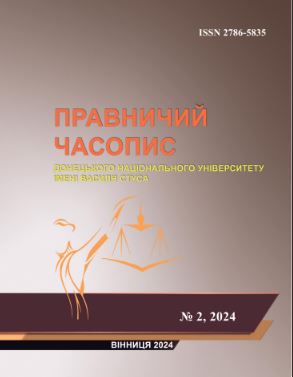Threats to the implementation of the idea of participatory democracy
DOI:
https://doi.org/10.31558/2786-5835.2024.2.5Keywords:
democracy, participatory democracy, threats, civic participation, public decision-making, public informationAbstract
The article is devoted to issues of threats to the implementation of the idea of participatory democracy.
It is suggested that under threats to the implementation of the idea of participatory democracy (threats of participatory democracy) recognize any circumstances or events caused by internal or external factors capable of disrupting the normal state of development of participatory democracy, which will ultimately negatively affect its effectiveness and in relation to which it is necessary apply certain prevention, neutralization and elimination measures.
It was revealed that the main threats to the implementation of the idea of participatory democracy in the modern world are: 1) citizens' access to incomplete and false public information and the limits of transparency of public authorities; 2) populism as a tool of political struggle; 3) framework of legal restrictions on civil participation; 4) blurring the responsibility of the state and civil society; 5) complication of the process of making a public decision due to an increase in time and other resources; 6) respect for the opinion of the majority without taking into account the opinion of the minority; 7) low level of education of citizens and experience in the management of public affairs; 8) absenteeism as a result of apolitical and passivity of citizens; 9) corruption at all levels of the power pyramid. It is emphasized that since participatory democracy is a dynamic phenomenon, the list of threats may change over time.
Proposals for overcoming the mentioned threats have been formulated. In the conditions of the existence of a wide list of threats to the implementation of the idea of participatory democracy, it is considered necessary to effectively involve the vast majority of citizens in consensus with the minority in the process of public decision-making through increasing their level of education and media literacy, leveling economic inequality and apoliticalness, ensuring mutual and equal responsibility with the acting authorities under the conditions of reasonable limits of transparency, anti-populism and integrity, guaranteeing legal conditions of influence on public administration (especially with the help of information and communication technologies).
References
Куницький М. Парадокси демократії у сучасній політичній теорії. Гуманітарний вісник. 2022. Ч. 35. С. 1329.
Дубецька С. П. Економічна безпека підприємств України. Недержавна система безпеки підприємництва як суб’єкт національної безпеки України: наук.-практ. конф., (1617 травня 2001 р.): зб. матеріалів. Київ: Вид-во Європейського ун-ту фінансів, інформаційних систем, менеджменту і бізнесу, 2003. С. 146172.
Плєтнікова І. Л. Визначення рівня і забезпечення економічної безпеки залізниці: автореф. дис. … канд. екон. наук: спец. 08.07.04. Харківська держ. академія залізничного транспорту. Xарків, 2001. 15 с.
Ткачук Г. Ю. Загрози та небезпеки діяльності підприємства: підходи до визначення та уточнення їхньої суті. URL: https://core.ac.uk/download/pdf/214867021.pdf
Корж І., Бірюк Л. Доступ до правової інформації в Україні в контексті європейських принципів партисипативної демократії. Право України. 2022. № 9. С. 4360.
Transparency / Britannica. URL: https://www.britannica.com/topic/transparency-government#ref1208602
Муртіщева А. О. Транспарентність у діяльності органів публічної влади: досвід зарубіжних країн. Юридичний науковий електронний журнал. 2021. № 10. С. 602606.
Печенюк Д. О. Партисипаторна теорія демократії як напрям сучасної американської політичної науки: історія становлення і концептуальні засади. Вісник Київського національного університету імені Тараса Шевченка: Філософія. Політологія. Вип. 2013 (2)112/. С. 4044.
Ковальов А. Партисипаторний напрям демократії як предтеча деліберативного підходу. Вісник Львівського університету. Серія: Філософсько-політологічні студії. 2018. Вип. 17. С. 180186.

